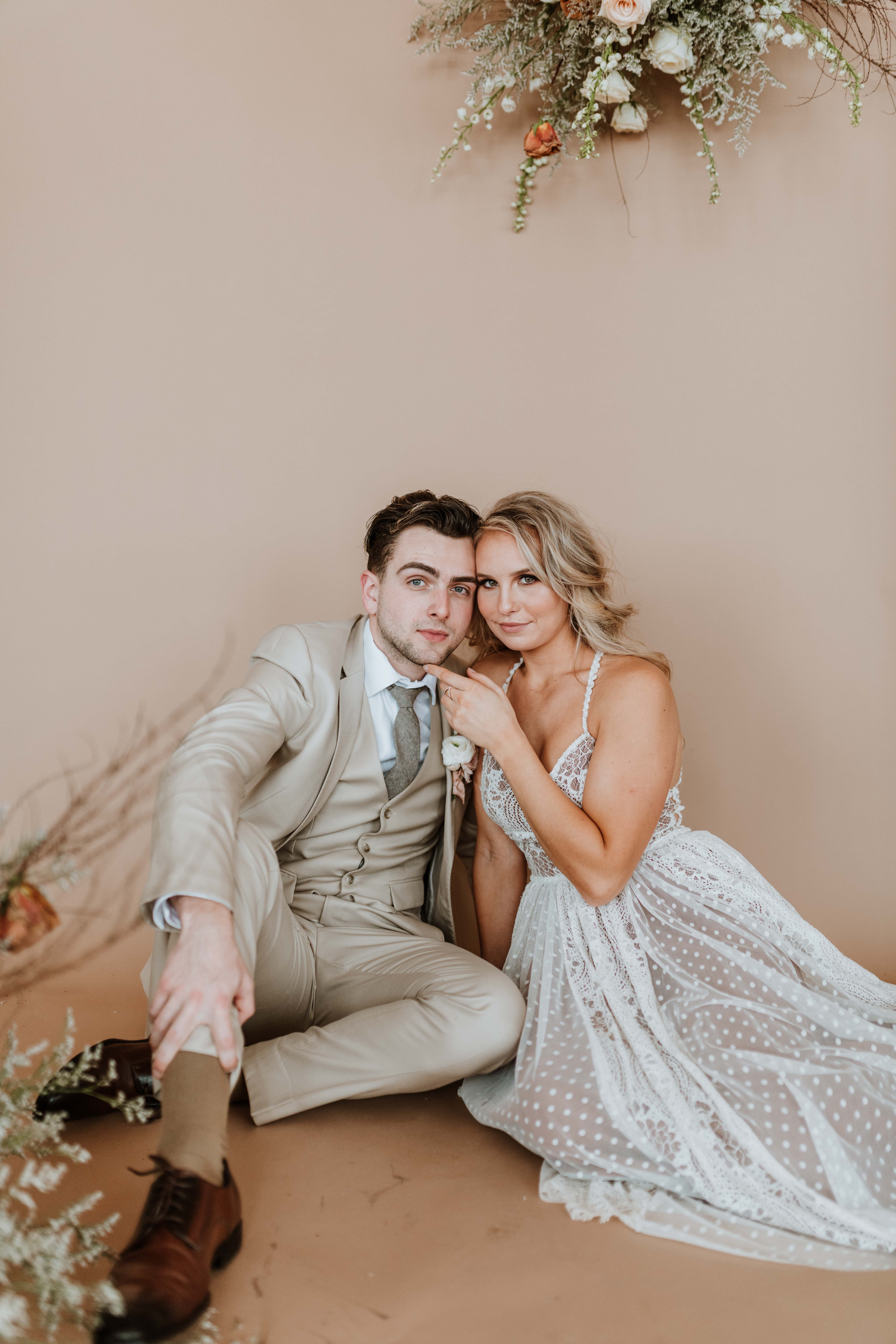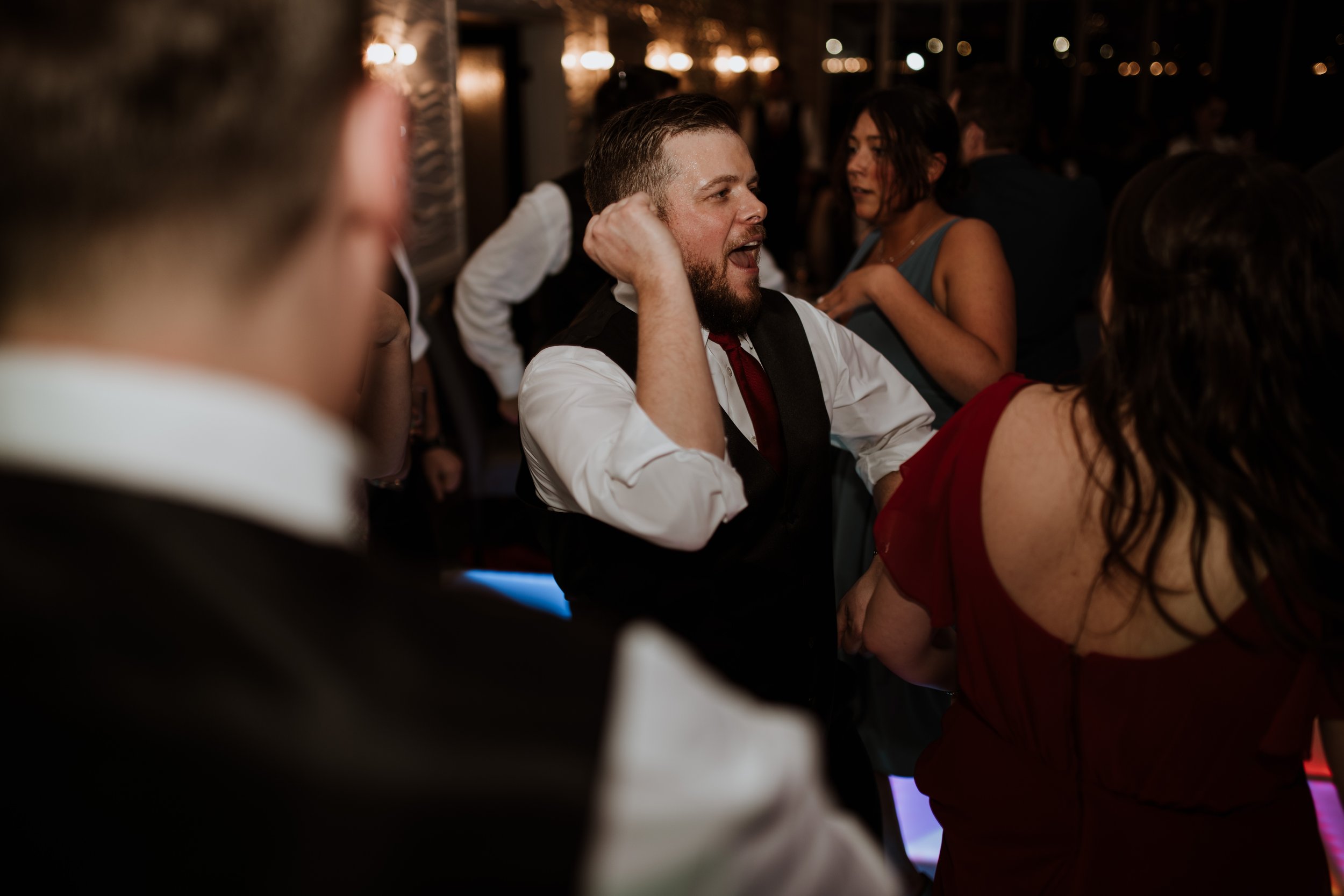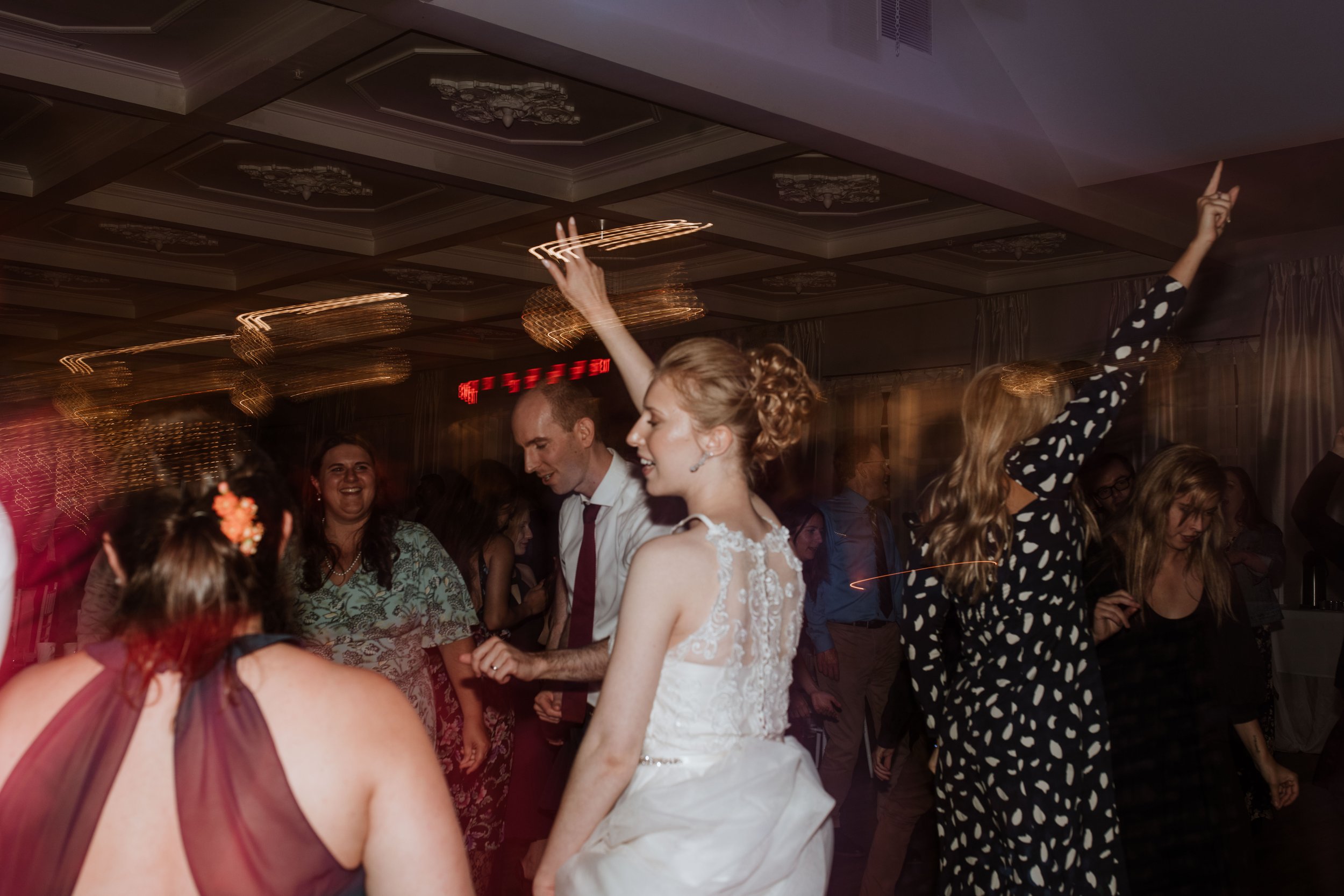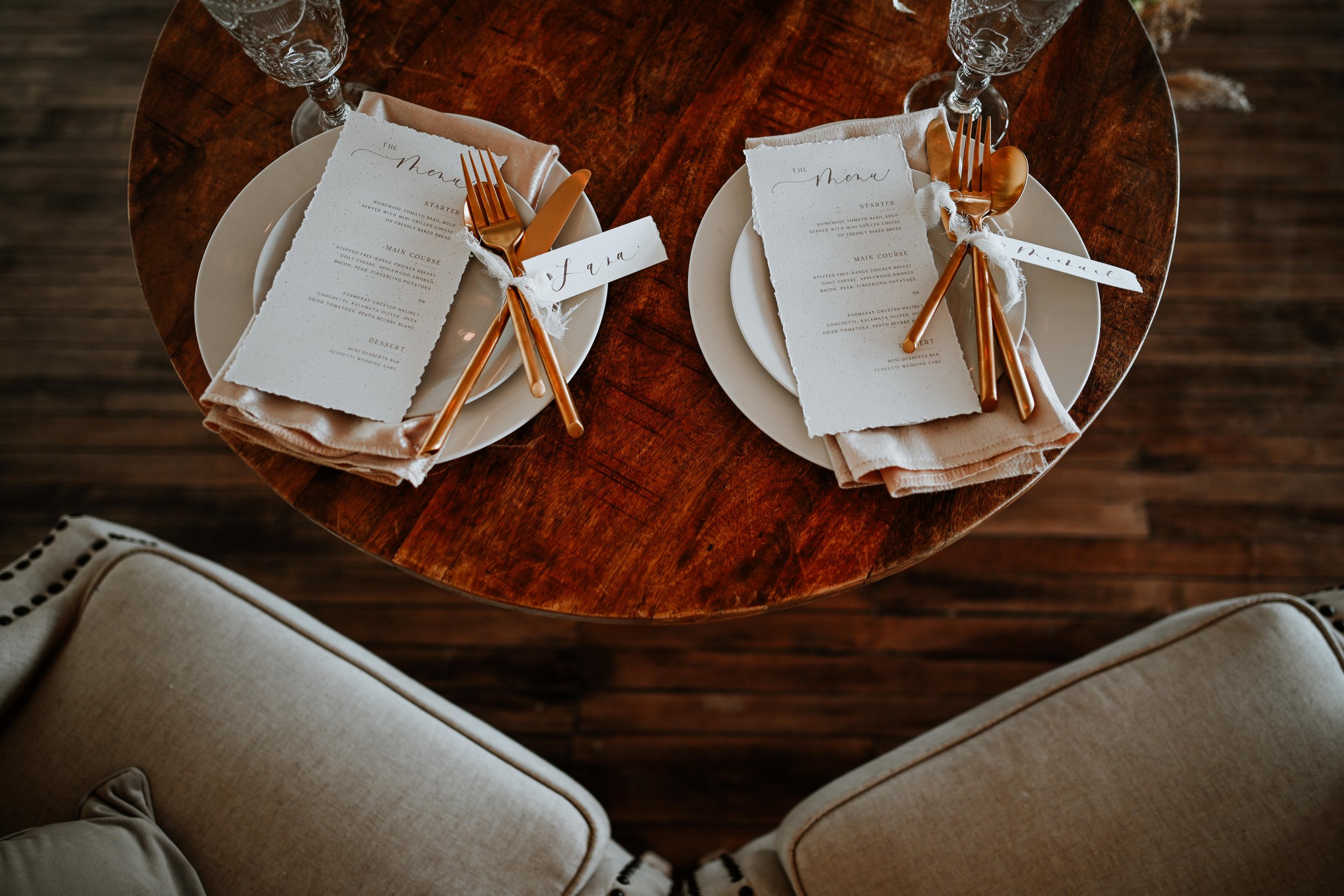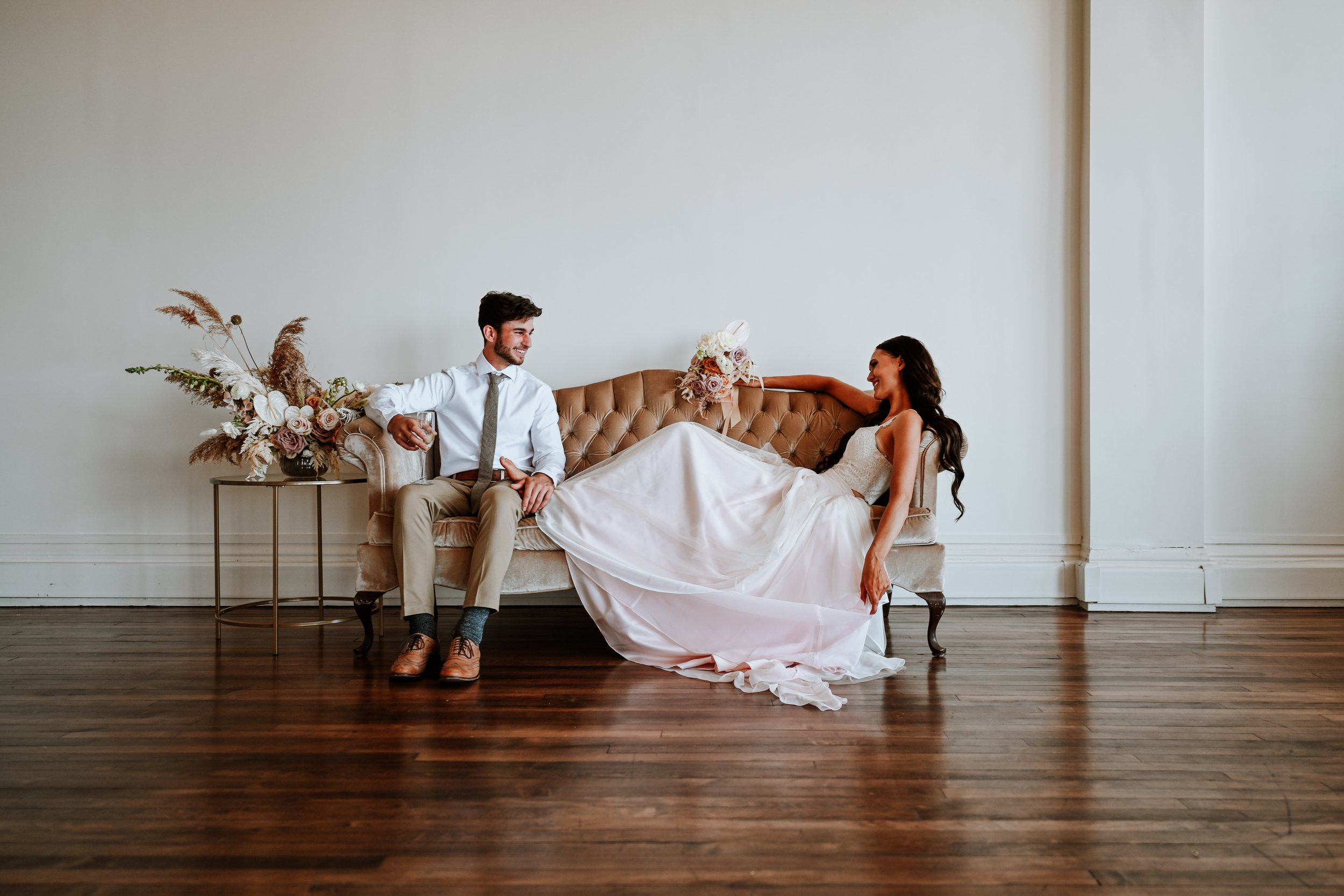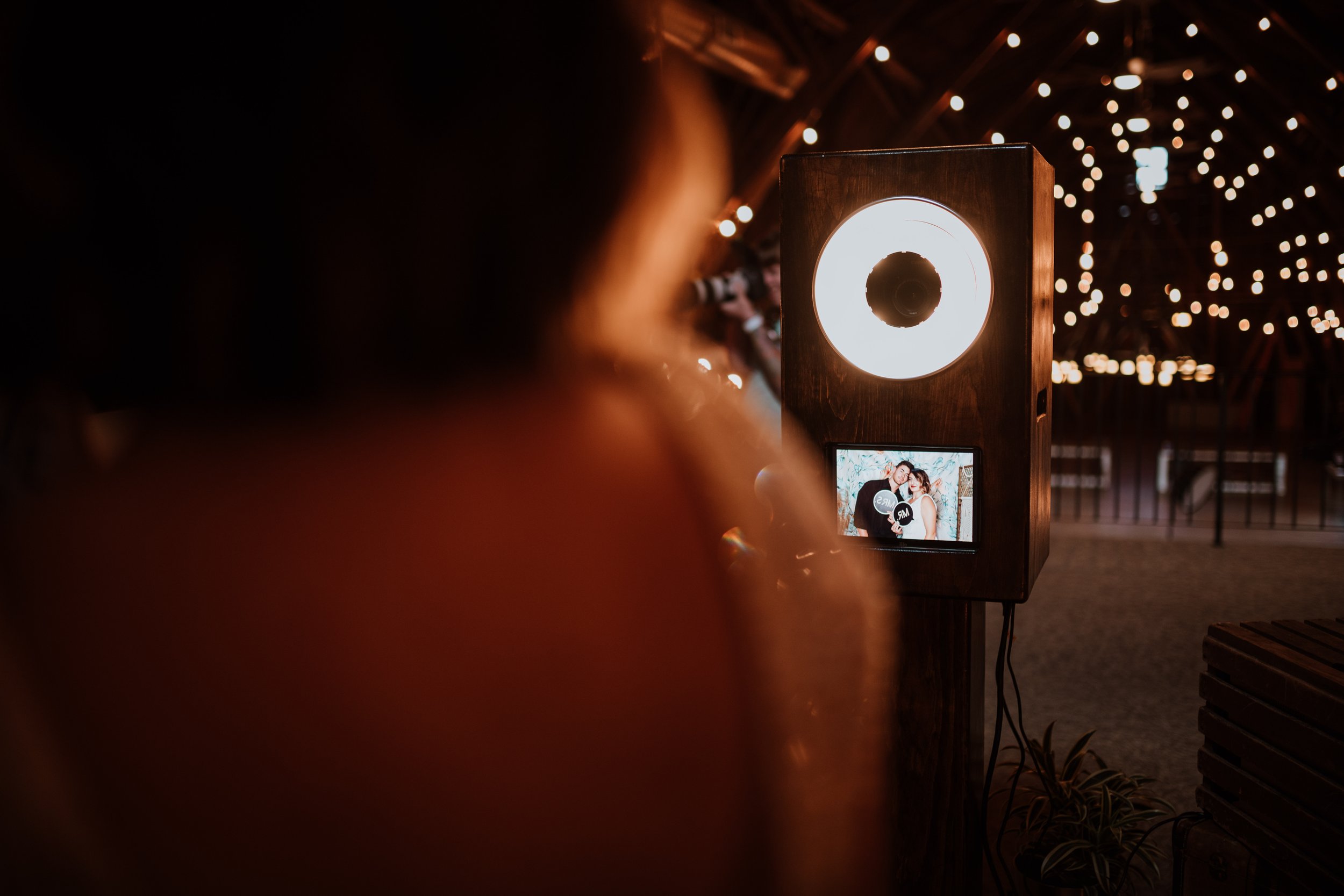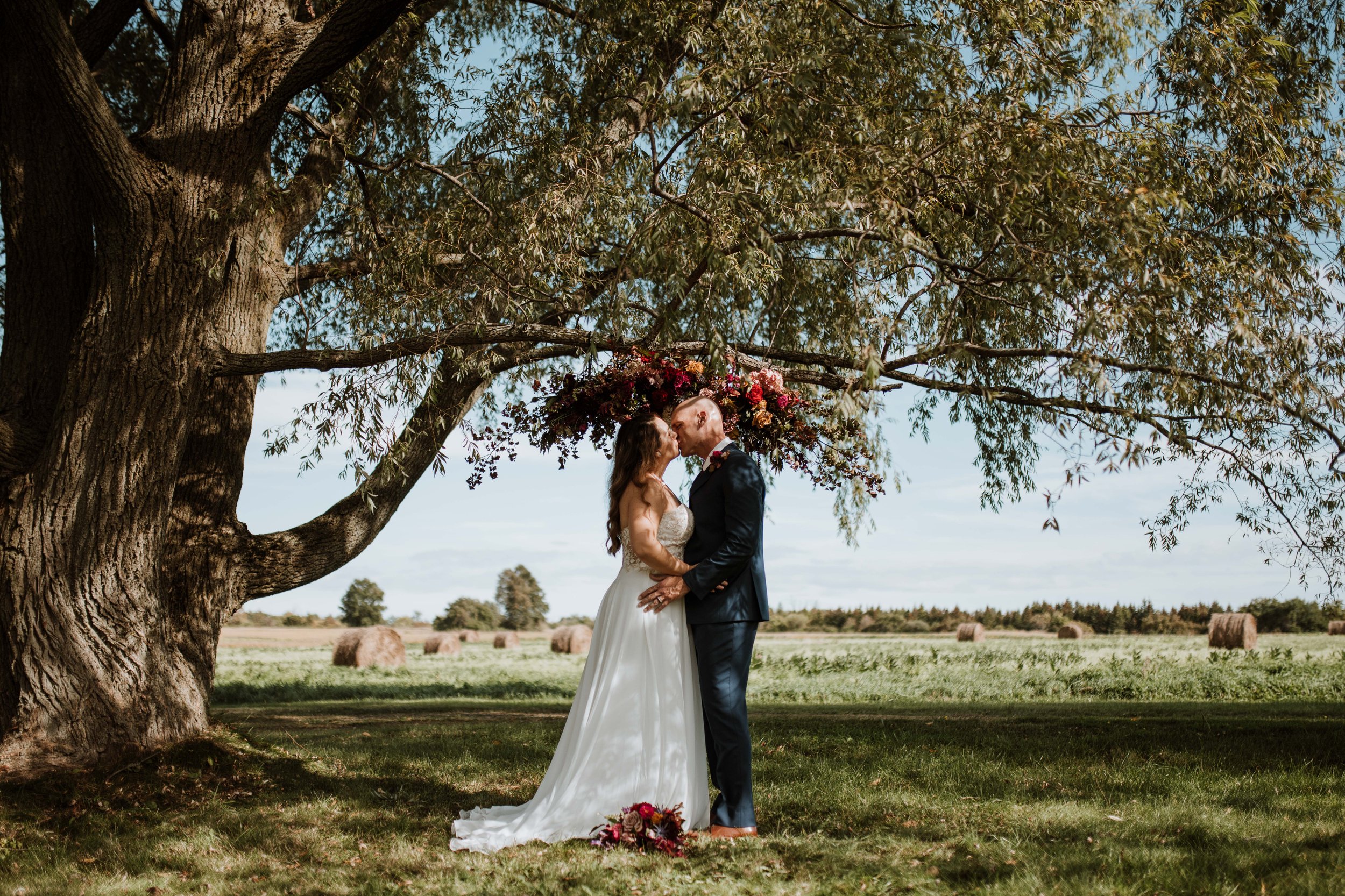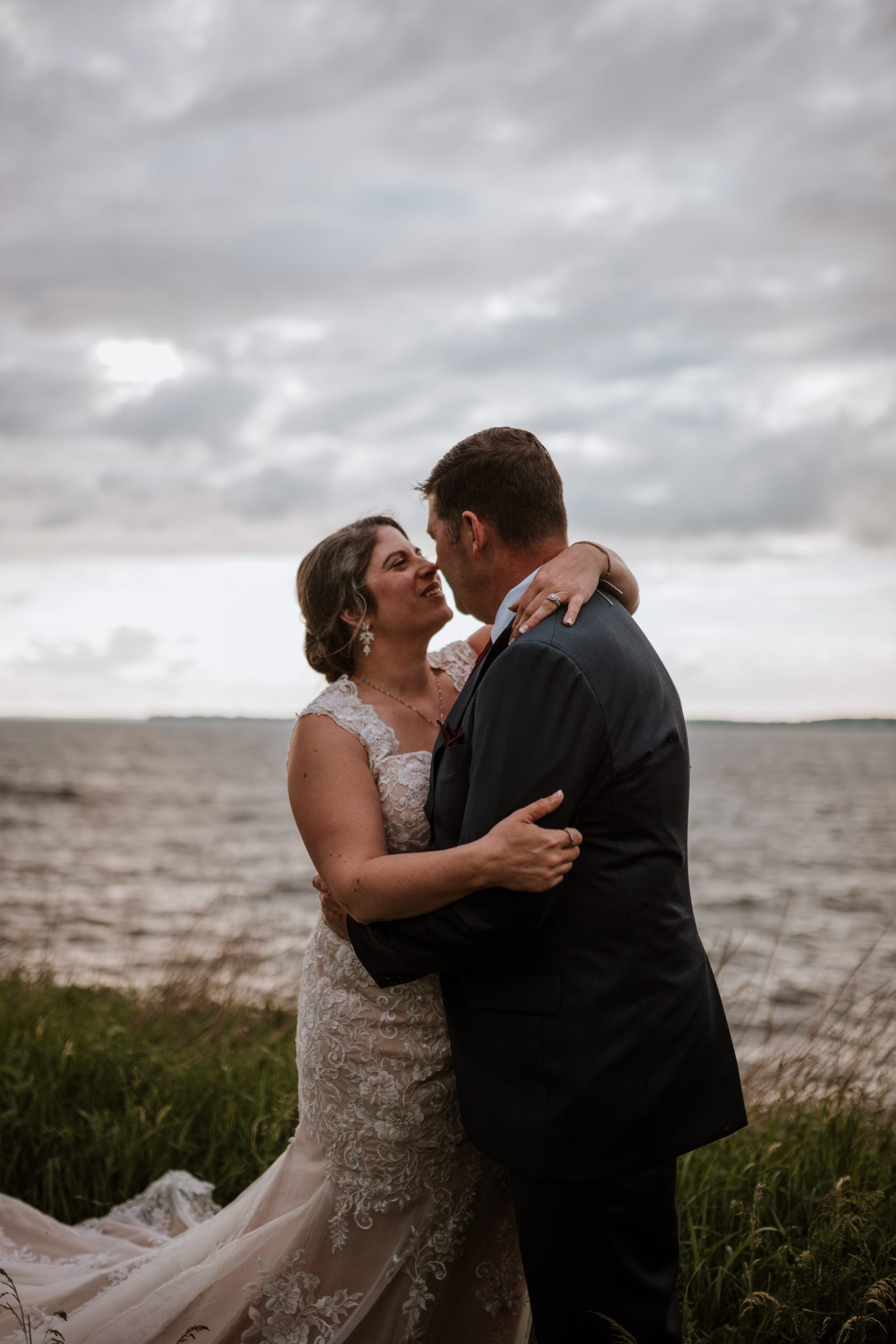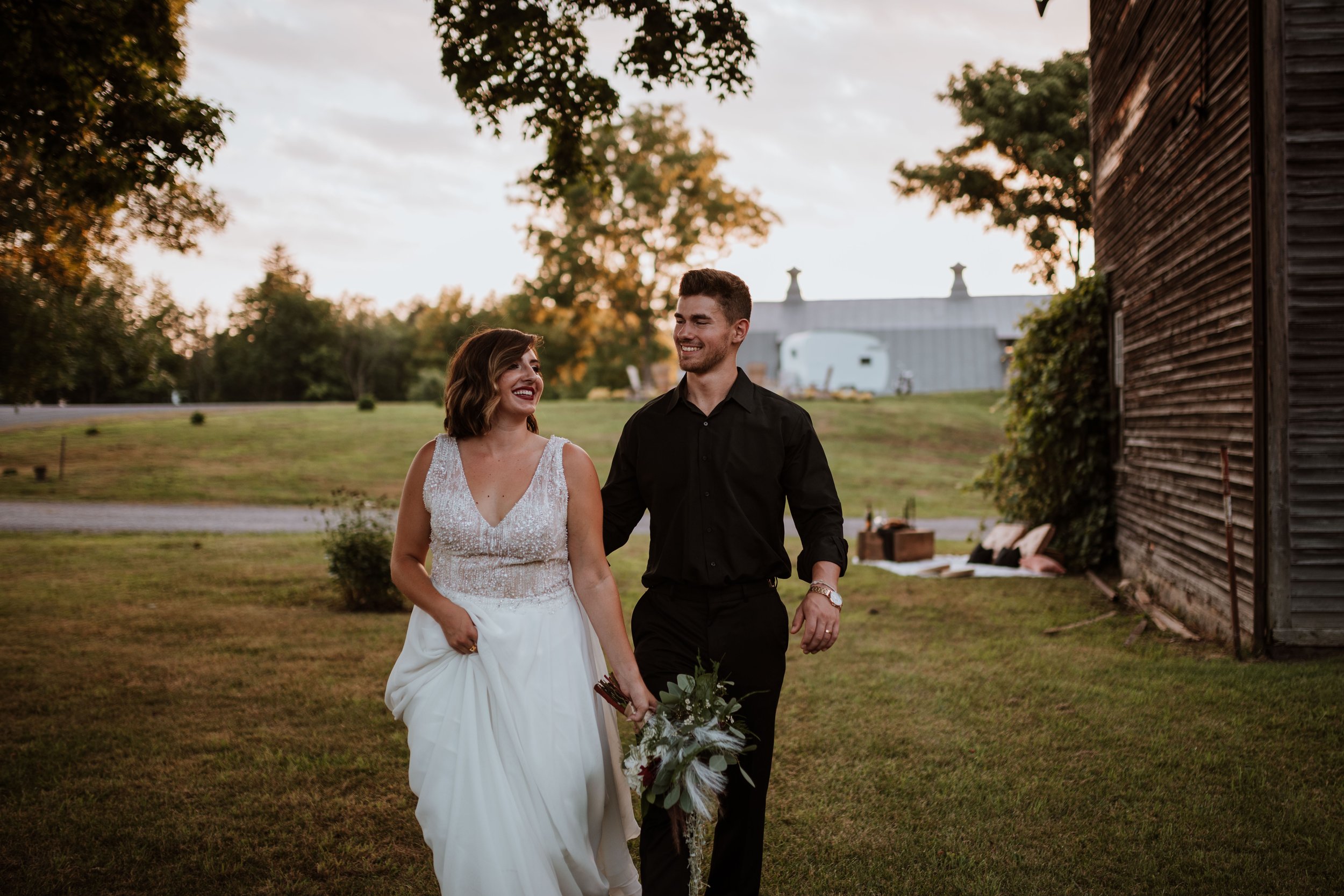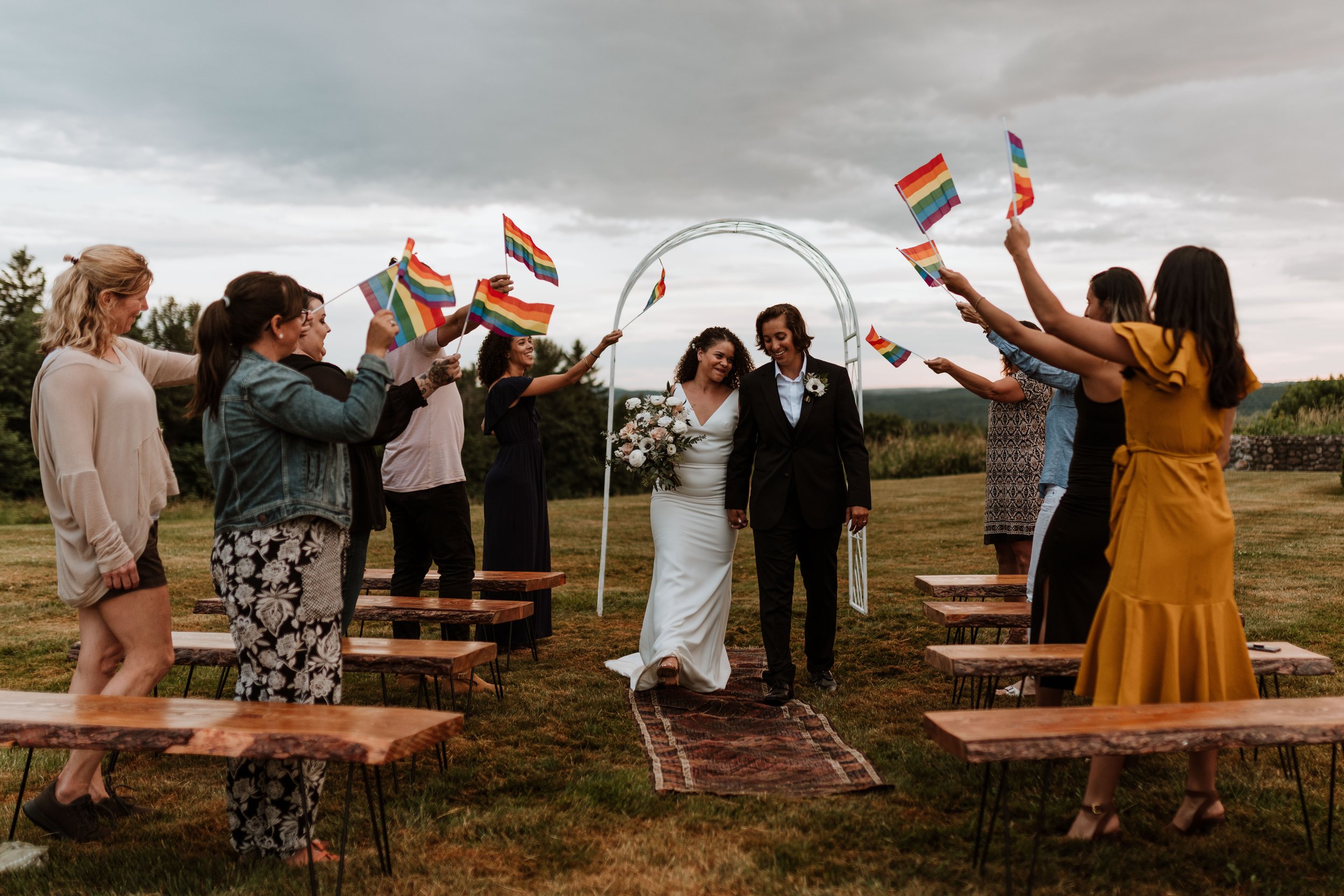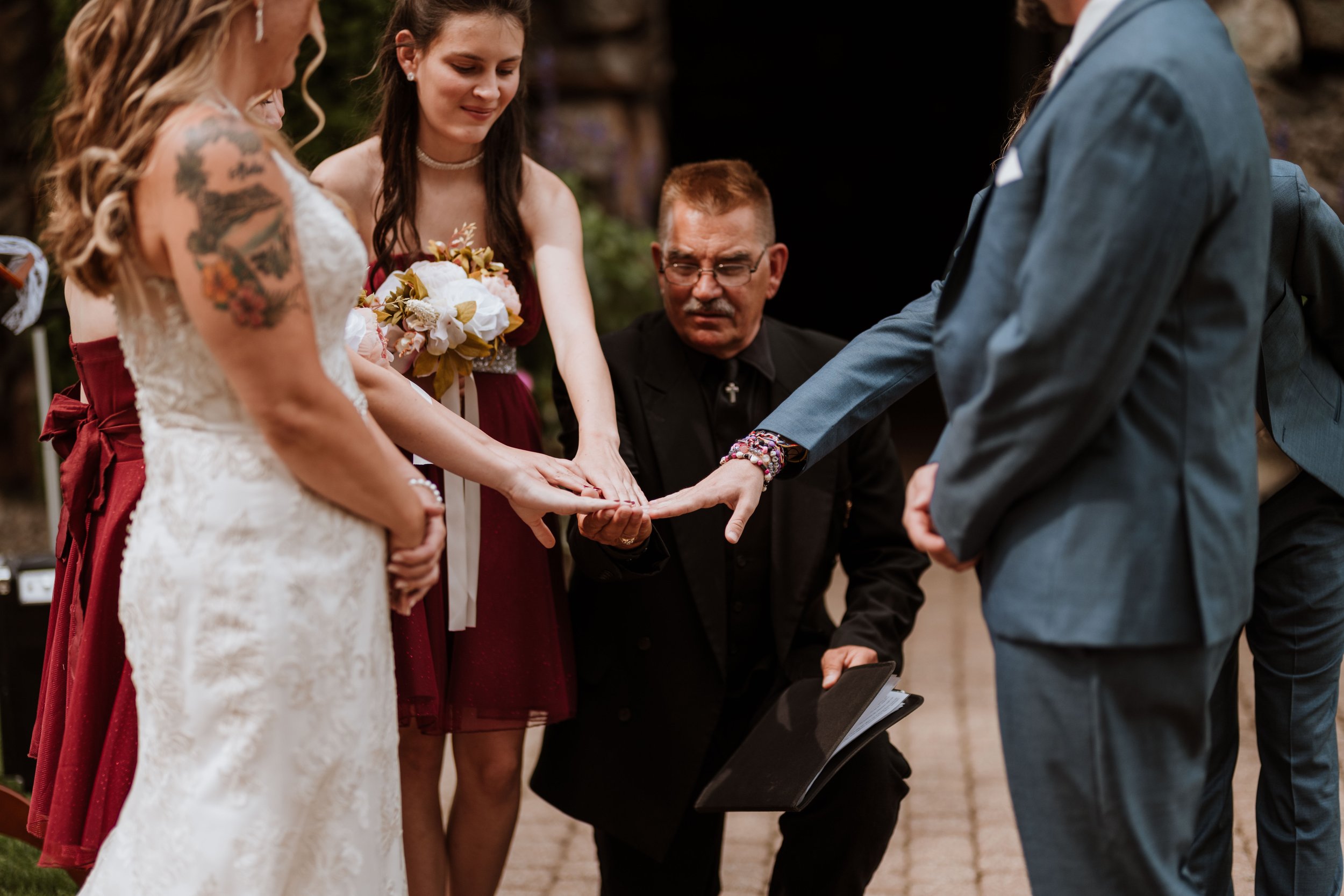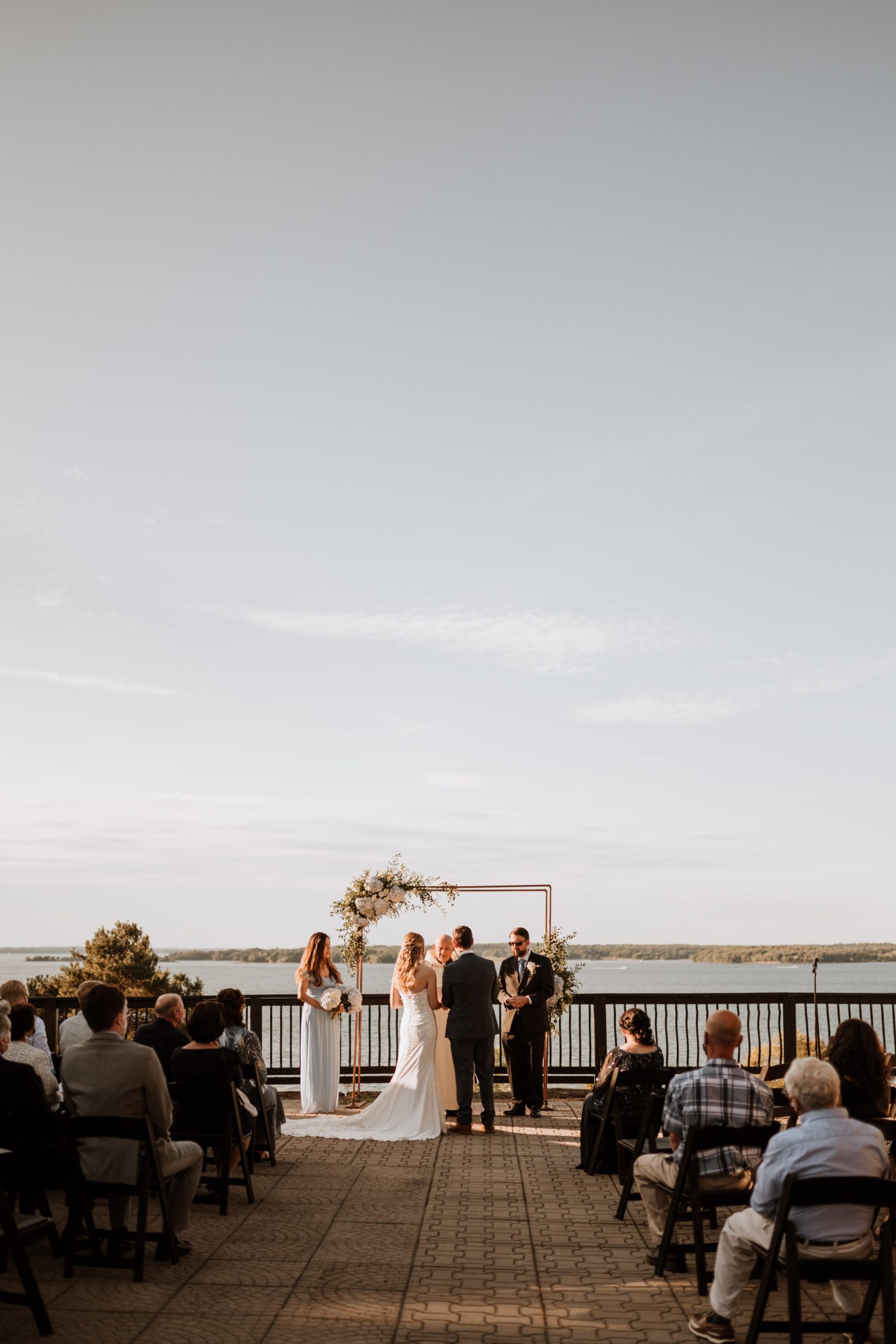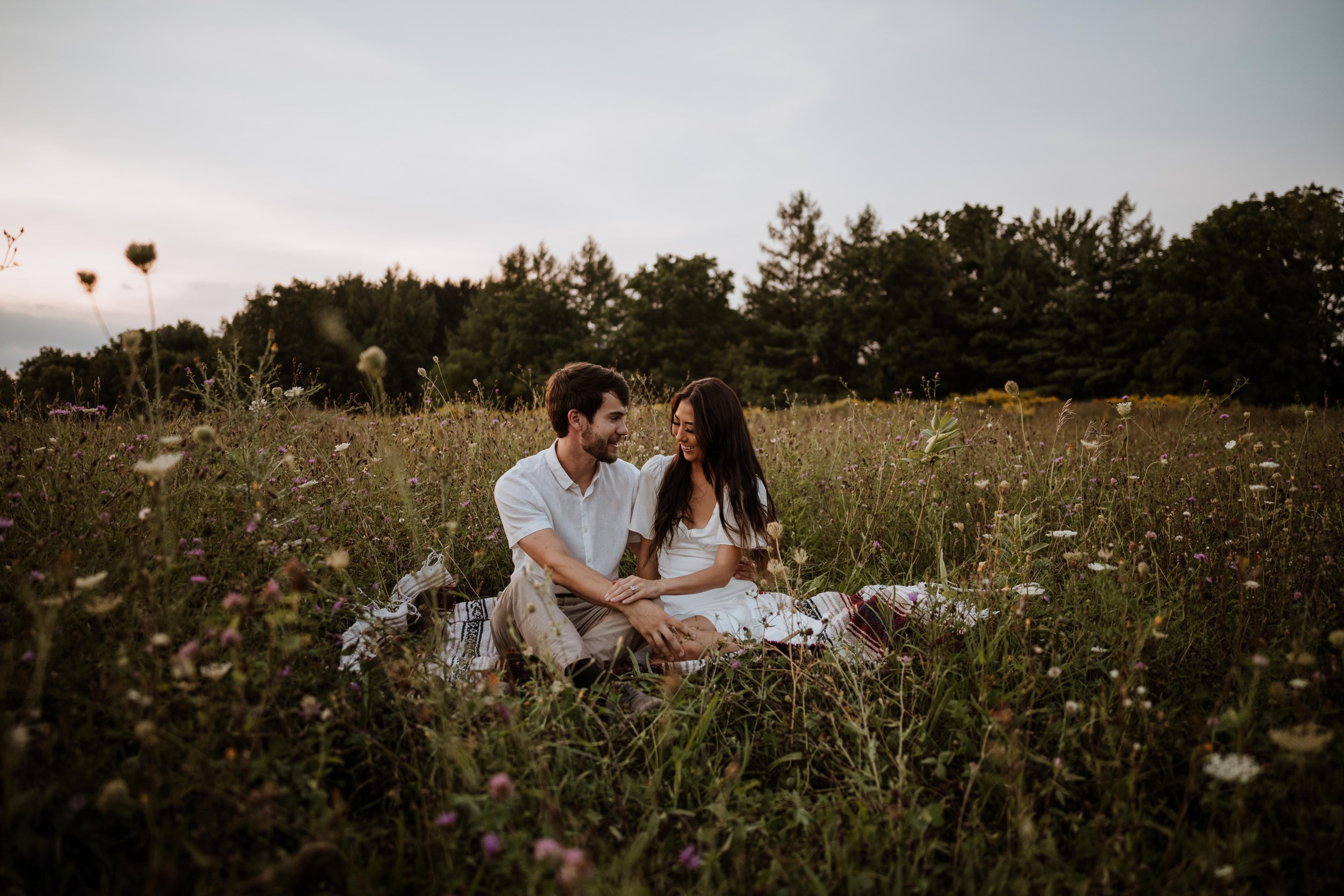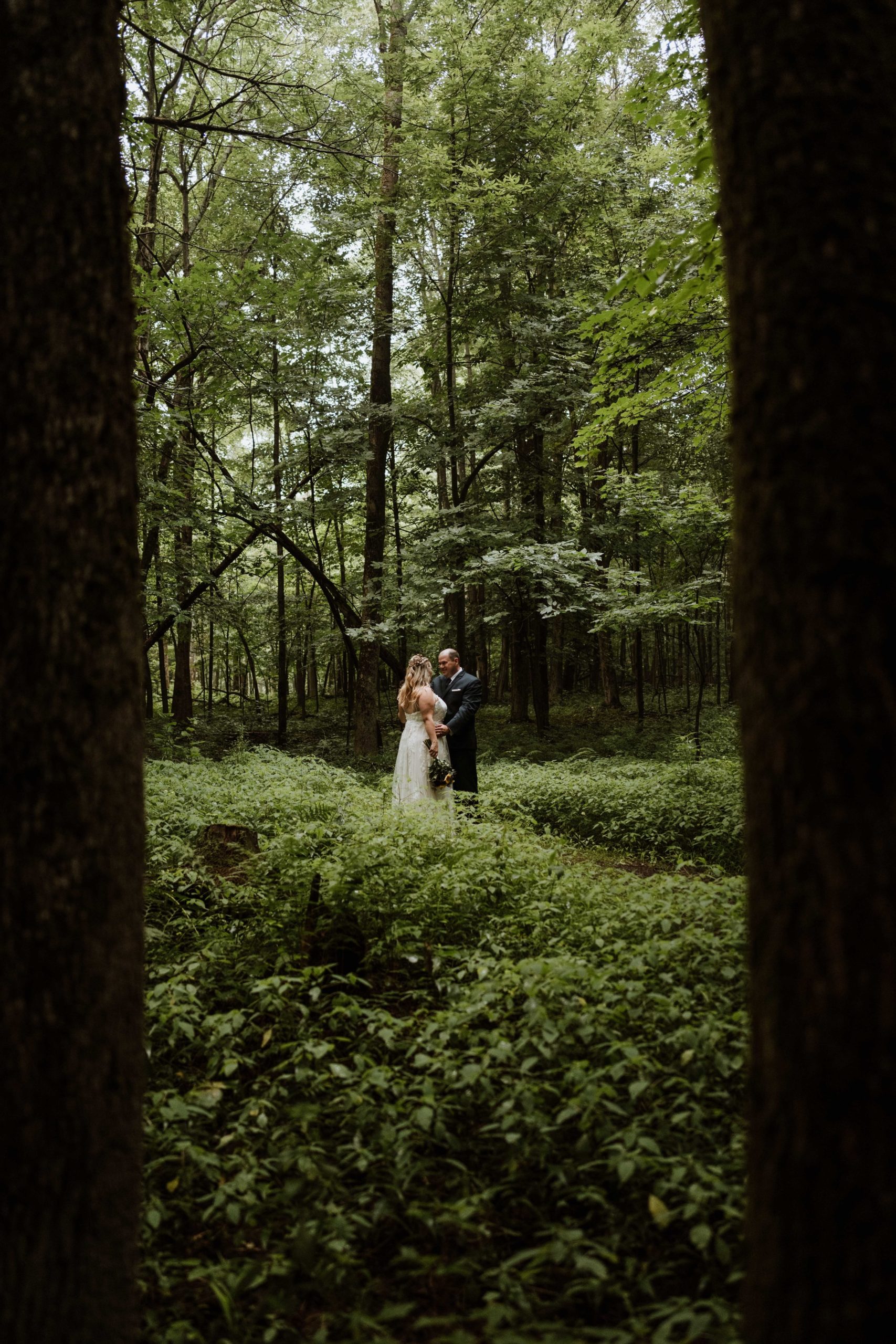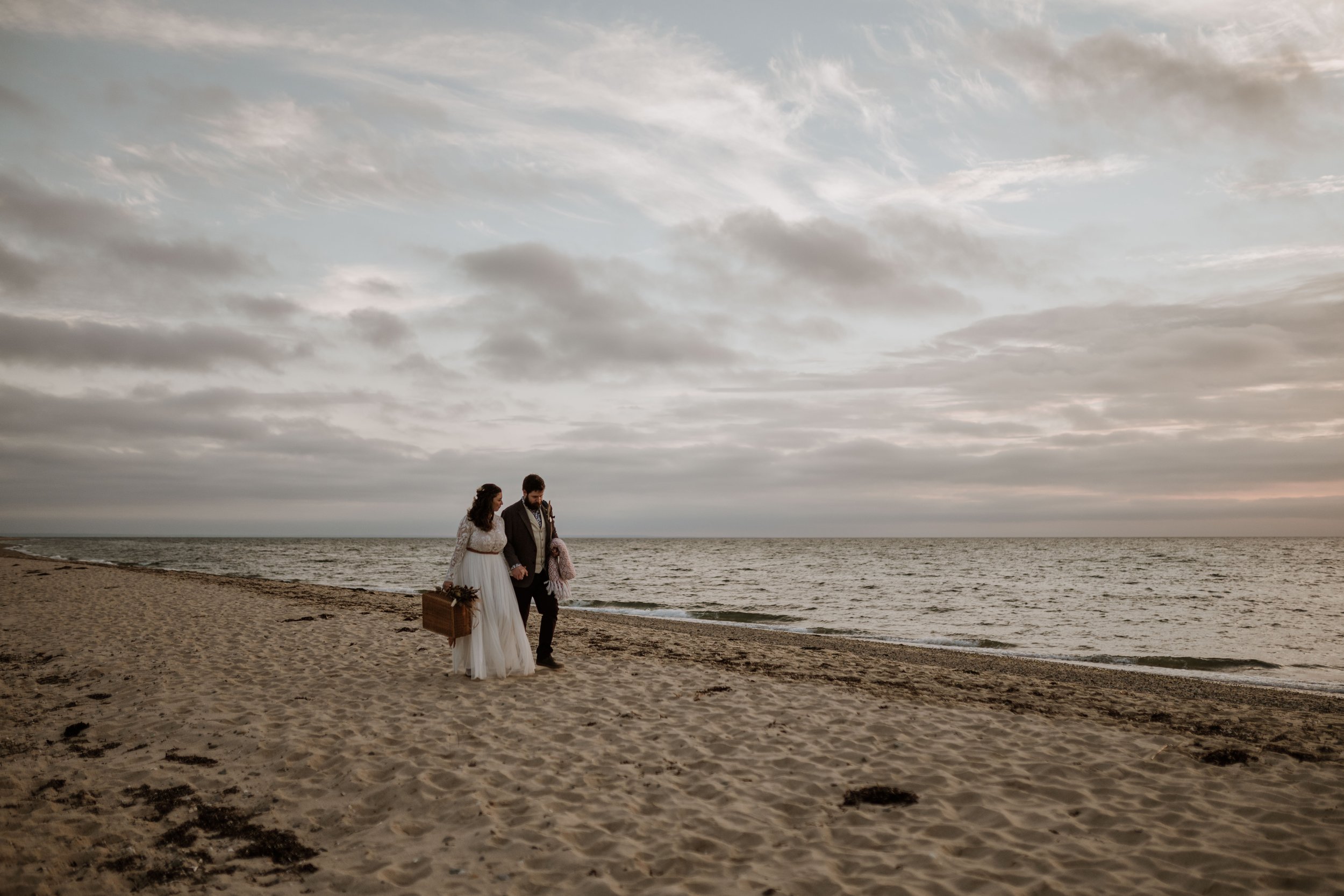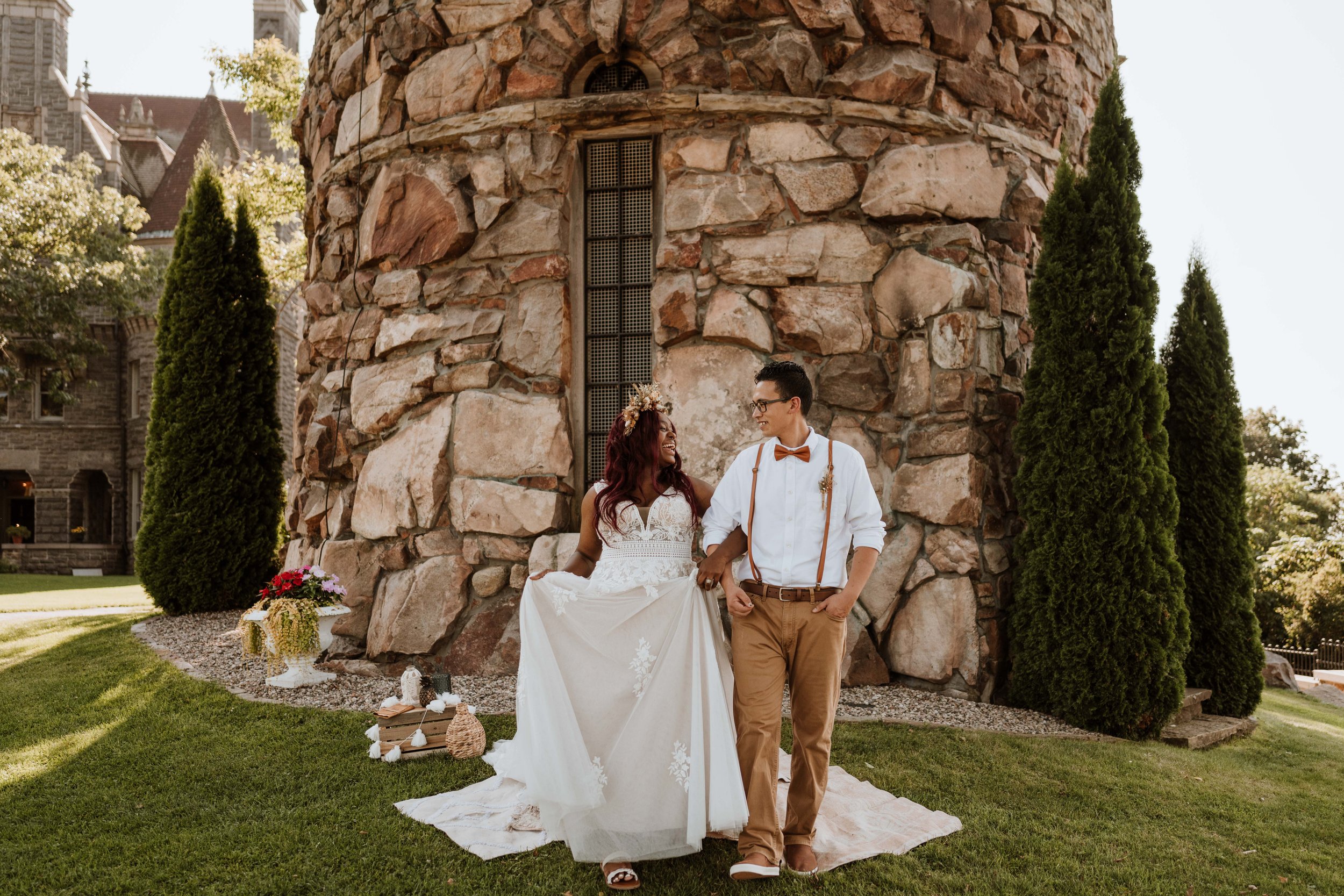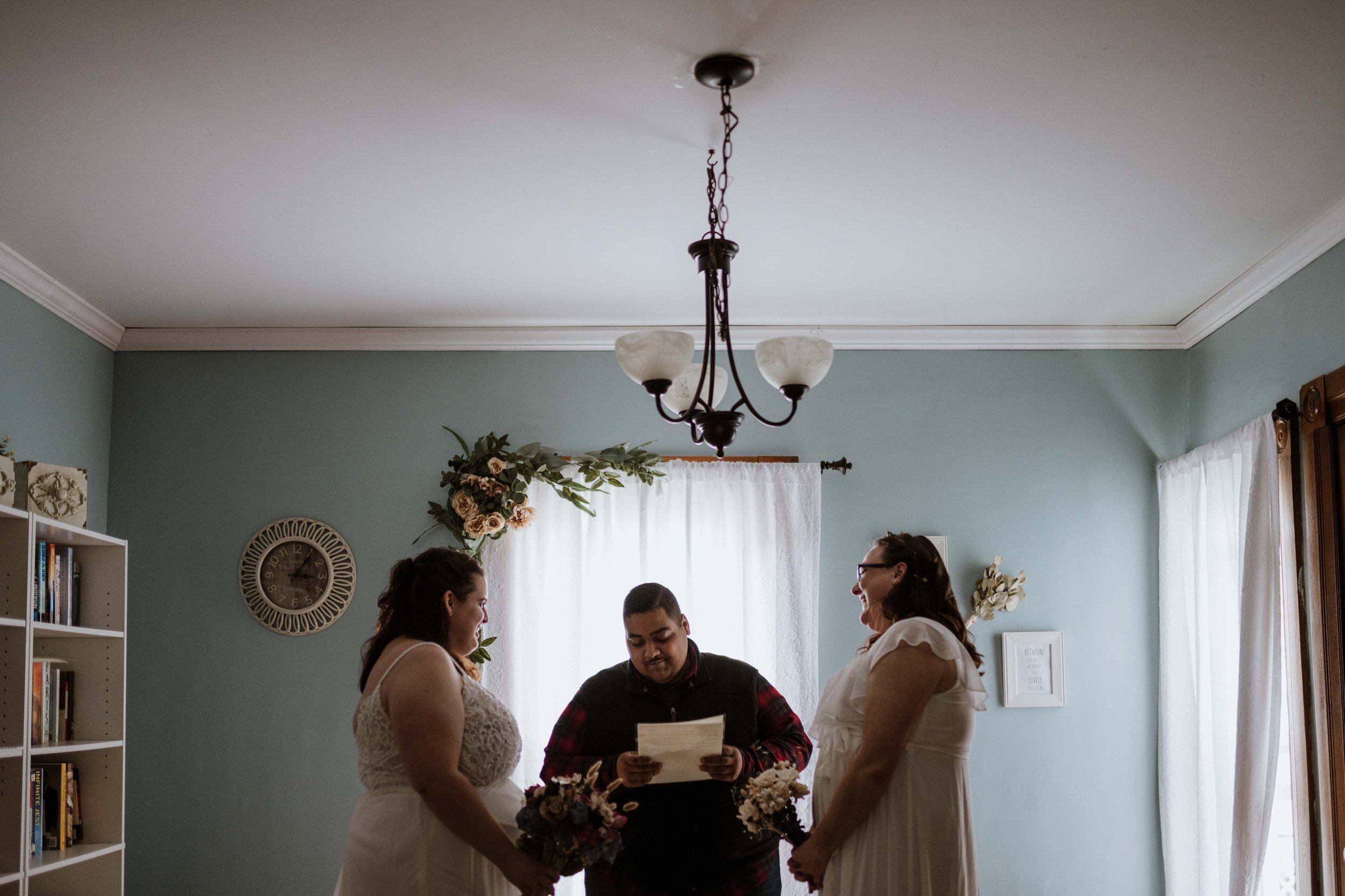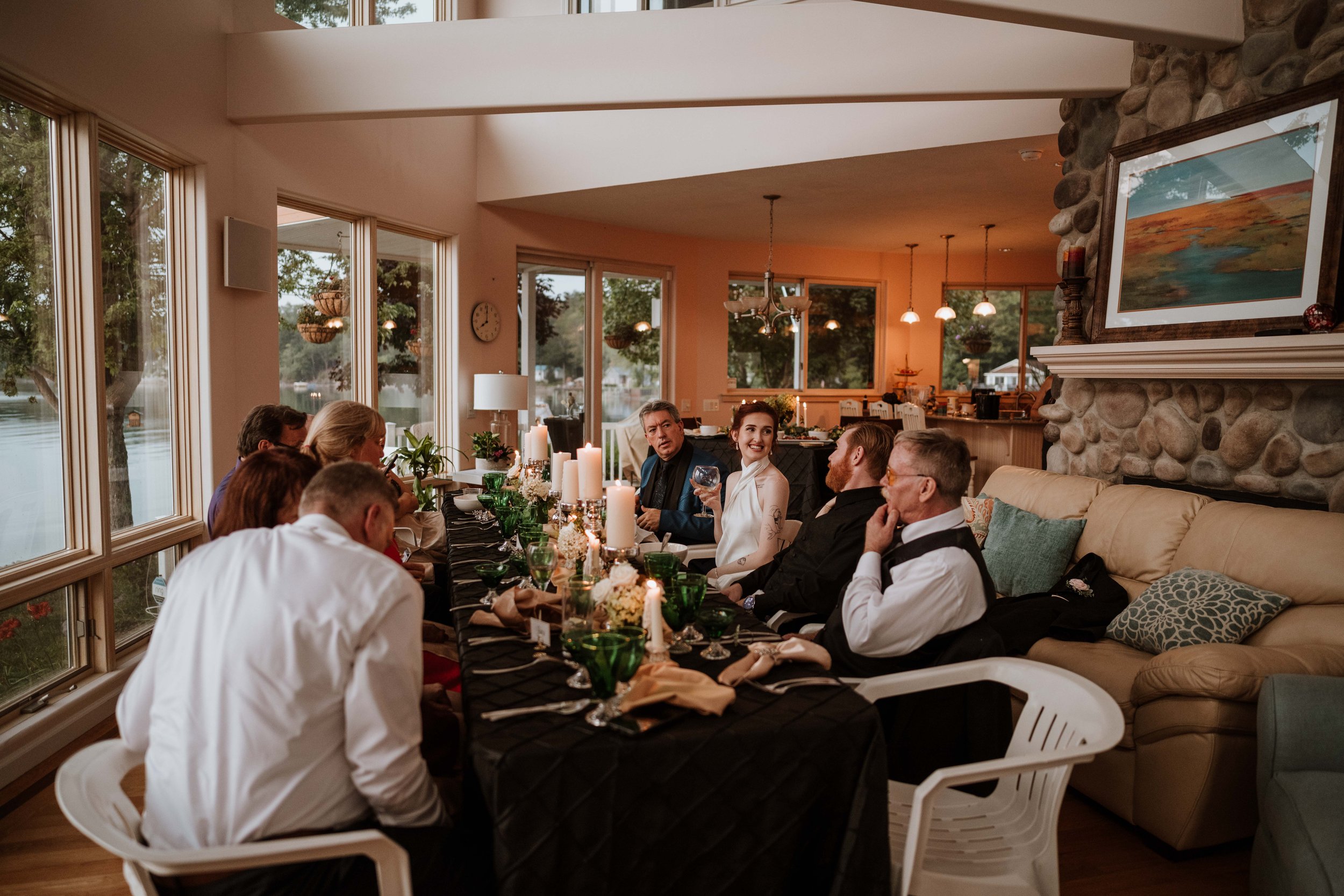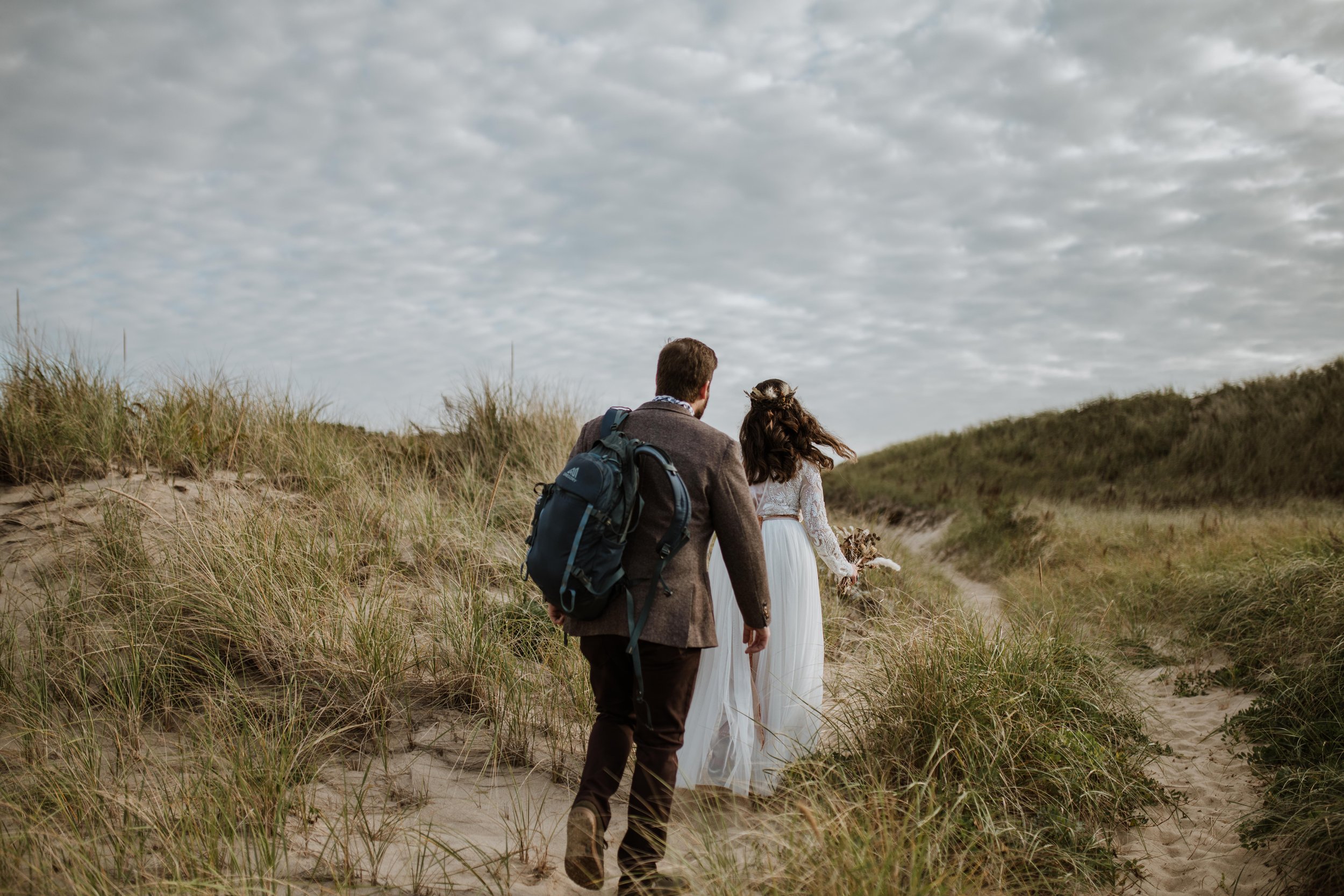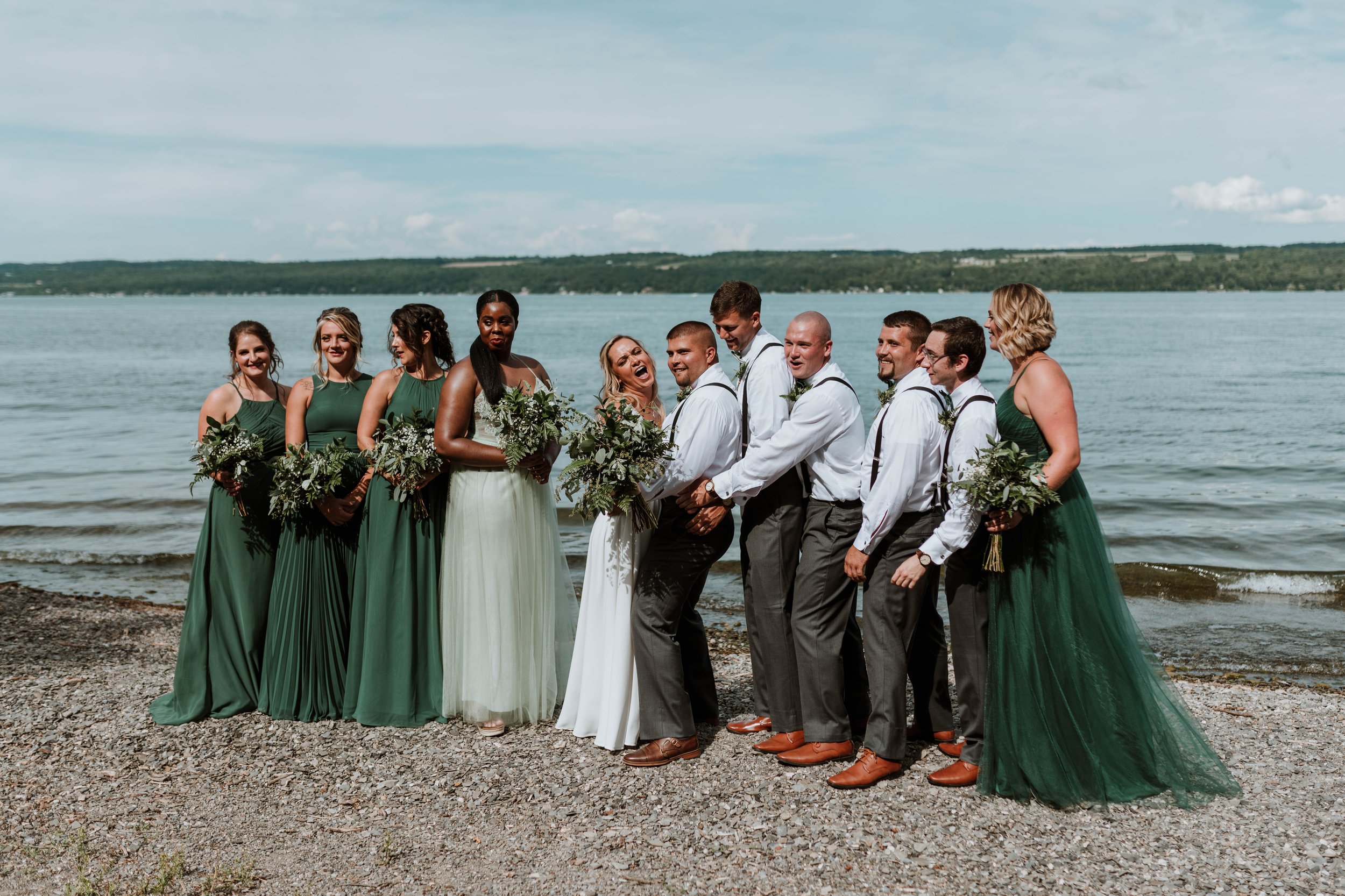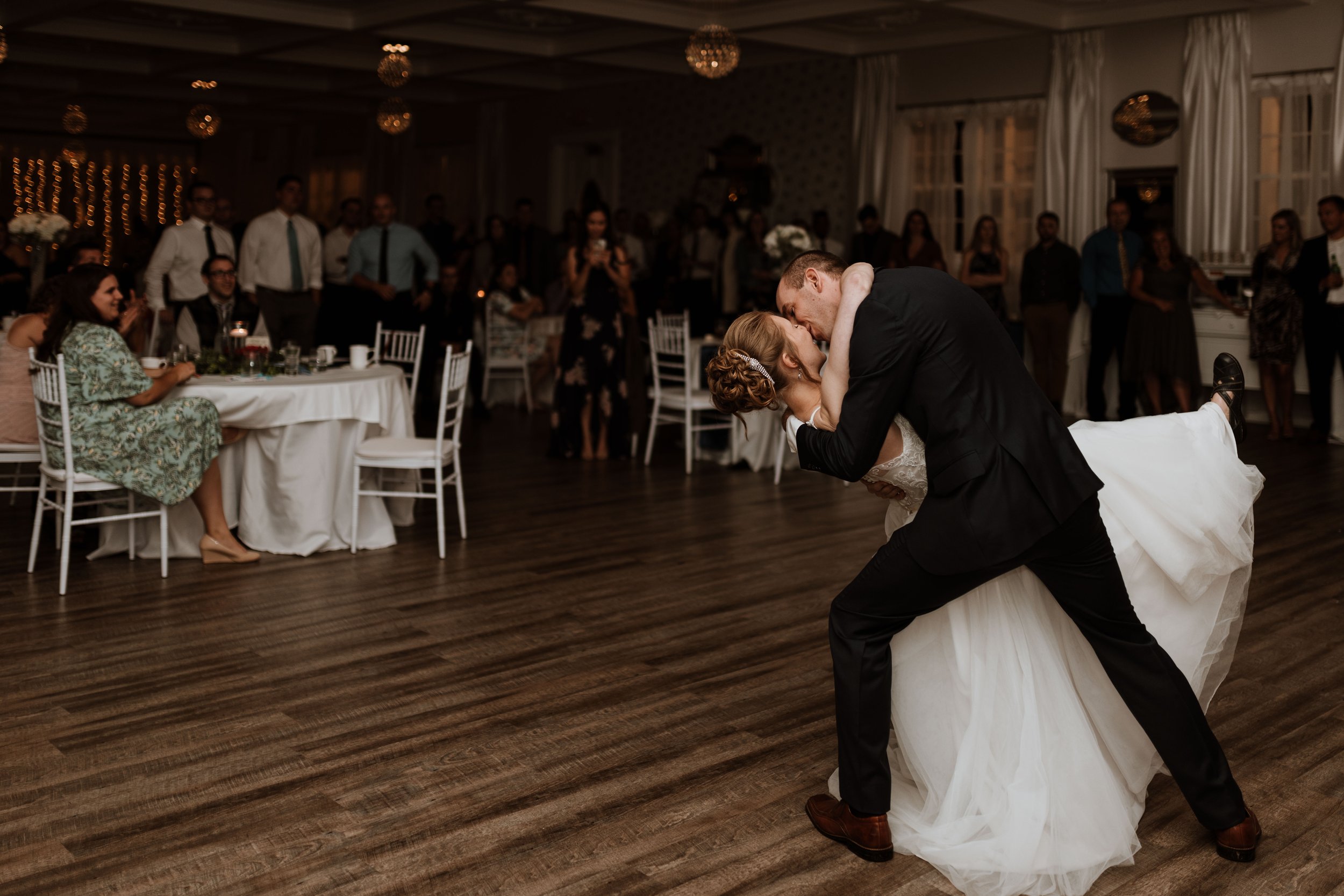
Deciding on whether to have a larger wedding is not solely based on how many people you know and love. It also depends on the type of experience you want to share with your partner throughout the wedding planning process and the wedding day itself. The decision to invite more or less than 100 guests can be a really difficult decision—but let me remind you that your wedding day is about you and your partner, first and foremost. No matter what you decide, it should reflect what you want. It helps to understand the different wedding types so that you can decide how you want to celebrate your day.
Here are the benefits and pitfalls of having each wedding type to empower you to choose which style of wedding celebration is best suited for you!
Benefits of a Large Wedding
Your guest list won’t offend others
If you’re a social butterfly and you have a large family that you love, a big wedding is ideal. If your guest list isn’t constrained, you don’t have to worry about potential difficult conversations or hurt feelings about not being invited. A larger wedding also makes it easier to accommodate for plus ones and children so that everyone can enjoy the festivities.
It’s guaranteed to be a party
A big wedding is exactly that, a giant party. So if you’re the type that likes to let loose in a large crowd for a good time, this kind of wedding is likely for you. In a lot of cases, the draw of a large wedding is the packed dancefloor at the end of the night. The atmosphere will absolutely be abuzz with positive energy when you have all your friends, family, and loved ones congregated to celebrate your new union with you.
You’ll meet minimum requirements with ease
A large guest list will come in handy if you’ve selected a venue, caterer, or other wedding service provider that requires a minimum threshold for their service(s). Whether it’s headcount or amount spent, a large guest list will help you in that endeavor. Larger, more “spendy” celebrations are also likely to open up otherwise reserved dates, locations and/or details that would otherwise be off the table.
You will not lack for help day of
A big wedding is a hefty event to plan, let alone execute. Being able to delegate tasks the day of, or even the day before is going to significantly lighten the load. (PSA: if you’re having a large wedding, invest in a wedding planner—they are 100% worth the money spent!) You should not be worrying about the minutiae of wedding planning the day of your wedding.
You can go grand with your plans
It goes without saying, a large guest list requires a venue that can accommodate a large guest list. With a larger space, you can add other details that you may not be able to in a smaller space such as a photobooth, a lounge area, or play corner for the kids. This way you can make sure that there’s something for everyone to enjoy if they aren’t dancers.
Need a photobooth service for your Upstate New York wedding? Check out Snapshots Photo Booth.
Need a lounge rental service? Check out Pretty Little Vintage Co..
Pitfalls of a large wedding
It can get expensive, quickly
Not everyone is Kim Kardashian and can host an elaborate wedding celebration without worrying about the price tag—and that’s perfectly okay! But with a large wedding, your spending budget is going to need to be something you’re comfortable spending. The average cost of a large wedding (roughly 150 guests) hovers right around $34,000 (according to 2021 data from The Knot).
Wedding planning stress is no joke
A larger wedding typically means more stress added to the wedding planning process. You have to find a venue that can accommodate your guest list, which can get really hairy at the 200+ mark here in Upstate New York. You may find yourself having to travel a bit further from home for a venue that can host your guest list. You’ll have to consider dietary needs of your guests, seating charts, and things to occupy children if you’re allowing them to attend.
It can be near impossible to spend quality time with all your guests (let alone your new spouse)
Let’s do some math. If your reception starts at 5pm, and ends at 10pm, you have 5 hours to fit in introductions, dances (such as first dance, and then parent dances), speeches/toasts, any traditional wedding events (such as bouquet toss), and dinner. Let’s say you manage to condense all those events into 2 hours. You have 3 hours to meet and greet all 100+ guests. Say you have exactly 100 guests at your wedding. If you have 3 hours (180 minutes) left of your reception and you want to greet each guest, you have 1.8 minutes with each guest to do so before the end of the reception. Not exactly enough time to have a meaningful conversation with that guest, is it?
Chances are, with a larger wedding, there will be guests that you just logistically won’t be able to talk to on your wedding day. That in itself can risk potential drama, especially if you’re requiring your guests to spend on travel and lodging to attend your wedding.
If you’re an introvert or socially anxious, it can all be overwhelming
If you’re more of an introvert, having a large wedding can be a really uncomfortable experience. Your wedding should never be an uncomfortable experience—period. Your wedding day should be a day of celebration, love, and ease. Regardless of the size of wedding, you’ll likely experience nerves, but don’t mistake that for unbridled stress that can arise from being overstimulated or overwhelmed. (It’s where ya girl can come in handy putting to use that psychology PhD she’s earned. I gotchu.)
Benefits of an Intimate Wedding
You’ll spend quality time with your favorite people
With a smaller celebration, you will definitely get more than the 1.8 minutes to spend with each guest during your reception. You won’t be required to rush around and fulfill social obligations, giving the day a more relaxed vibe so you can enjoy the day with more intention.
Wedding Planning is easier
This doesn’t mean that it will be a breeze, per se, as there is still some fair amount of planning that goes into hosting an intimate wedding. But there will be significantly less items to check off your task list. Things like parking, restroom accommodations, and seating plans aren’t pain points with most intimate weddings.
Wedding venues don’t have to be conventional
With a smaller guest list, you’re not bound to the typical ballroom wedding venue. A smaller guest list opens up some non-conventional alternatives that are off the table for larger weddings. Places like: a gorgeous AirBnB, an art gallery, a private garden, on a yacht, or at your favorite National Park.
You can involve your guests in your ceremony
Depending on the size of your intimate wedding, you can opt to involve your guests in your ceremony. This can look like Ring Warming, standing around you in a circle as you read your vows to one another, or reading lines from a prayer, poem, song, or sharing wedding advice with you.
It’s easier to be more eco friendly
Let’s be real, weddings can have a huge impact on our environment. From disposable table wear, to left over food, and remnant florals, the average wedding can produce 400lbs of garbage and 63 tons of CO2 (according to The Green Bride Guide). With a smaller wedding, you’re going to have a lesser environmental impact.
You’ll save on budget, or you can opt for a more decadent experience
The obvious benefit with a smaller, more intimate wedding is financial savings. If your budget is smaller, a large wedding just may not be feasible. Alternatively, by reducing your guest list, you can craft a more intentional, handcrafted, and decadent wedding experience. A wedding with 50 guests and a budget of $20,000 is going to look significantly different from a wedding with 150 guests and the same budget.
Pitfalls of an intimate wedding
Your guest list will be harder to create
This is especially true if you have a lot of friends and family. Having a smaller wedding means you may potentially have uncomfortable conversations on why someone is not on the guest list. You may also be on the receiving end of pressure from parents or other family members to invite your great aunt Sandra.
Some wedding venues/vendors require a minimum amount
Whether that be in guest list size or spending amount, there are venues that require you to meet a particular threshold. A smaller wedding may mean that a venue or vendor (such as a caterer) that you were considering is off the table.
If you’re constrained to a smaller wedding due to budget or location, there may be regret
If you’re opting for a smaller wedding because you don’t have the available budget for a larger wedding, or you’re in a location that’s far from friends or family, you may experience some regret in having a smaller wedding later on. (The same can be said for having a large wedding when you really wanted a small wedding!) In the case of small wedding blues, you can always have a larger gathering later on. This is why it’s so important to craft a day that reflects exactly who you are. Your wedding day should not leave you feeling regret.
Benefits of an elopement
Focus on you and your partner
With an elopement, you erase the stress of having to be a people-pleaser. Instead you go to the roots of what a wedding ceremony is really about—declaring your love and committing your life to your partner. If you opt for a “Just Us” elopement, you no longer have to worry about living in the moment of your emotions during your ceremony—you’re safe and free to cry, say what you really want from the heart, and experience all the emotions in that moment without onlookers. You gain significantly more privacy when you decide to elope over both a small or large wedding.
You can also opt to have an officiant if you’d like someone to lead your ceremony, or self-solemnize (just check which states/provinces allow this). You can also opt to have your paperwork that makes you officially married completed beforehand, or a later date so you’re not bound by technicalities day of. BONUS: Ya girl is an ordained officiant, so I can absolutely sign your marriage license and/or lead your elopement ceremony should you like!
Reduce Reception Scouting Stress
If you opt for a “Just Us” elopement, you eliminate the stress of finding the perfect venue for a reception. If you opt for an elopement involving 15 or fewer guests, your possibilities for a venue become endless: your favorite brewery, a fancy restaurant you’ve always wanted to try, hiring an in-home personal chef… the options are seriously endless.
You can literally go anywhere
By opting to elope, you can basically choose any location on the planet to have your ceremony without worry. Want to elope on a mountain top? Do it. Beachside? Do it. In your living room. Do it. You’re free to choose a place that you’ve always wanted to visit or experience, or a place that is significant to you both—there are no hard-fast rules on where you have to elope.
You can spend the day any way you’d like
Large weddings, and even smaller weddings have a schedule that typically has to be closely followed. Eloping allows you to take the day at your pace, with room for adventure, activities, or relaxation.
Your budget is used to create an experience
Eloping allows you to craft a full day experience. An elopement with a $20,000 budget can be a once in a lifetime travel experience where you celebrate your wedding over the course of a week, versus a singular day as with a large or small wedding. And since there are no strict rules on what your elopement has to look like, you can always opt for a private ceremony, and then a small reception with family and friends afterward.
Pitfalls of an elopement
Be ready to stand your ground
When you decide to elope, you may be met with resistance, questioning, or hurt feelings from friends or family members. Check out my blog post on How to Tell Your Family That You’re Eloping. You’re going to have to be ready to stand your ground when you do announce that you’re eloping or that you’ve eloped.
Pressure to elope like others
Don’t fall victim to thinking that your elopement has to look like the elopements that you see all over social media! The premise of eloping is handcrafting a wedding experience that truly reflects you and your partner for you both to enjoy. Eloping doesn’t mean you have to hike 10 miles up a mountain if you’re not about that. Want to elope on a farm surrounded by chickens? Do it. (And please bring me along.) Want to hop down to city hall and make it official? Do it. No matter how you decide to elope, make sure it’s something you want to do.
Elopements aren’t planning-free
While an elopement can involve less planning compared to a large or small wedding, that doesn’t mean they require no planning. Depending on how many details you want to include on your wedding day, you may still be required to put in a bit of planning. Pro Tip: Hire a photographer who has experience helping couples with all the logistics involved in having an elopement, like yours truly.
Regardless of what you decide…
Make sure that you choose the style of wedding celebration that suits you.
The bottom line is that your wedding is ultimately about you and your partner. Your wedding should never be something that someone outside of your relationship expects or pressures you to do. The decision to elope or have a small or large wedding is something you should decide with your partner, and then stand firm in your decision together.
Sending you and your partner all the love as you journey through your own wedding planning stages,
xo Donna Marie
Here are some other wedding planning and elopement resources for you to check out!
10 Dinner and Food Ideas for Elopements and Intimate Weddings
